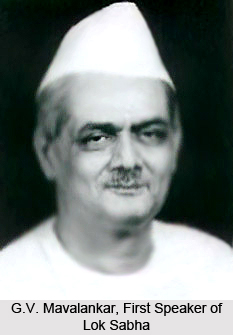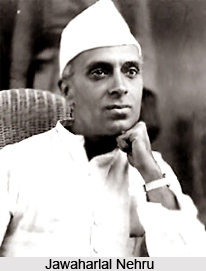 In the wake of India`s Independence on 20 August 1947, a committee was constituted to study and report on the need to separate the Constitution-making role of the Constituent Assembly from its legislative role. Mavalankar was appointed to head the Committee. The legislative and Constitution-making roles of the Assembly were divided on the recommendation of this Committee`s. It was decided that there should be a Speaker to preside over the Assembly when it worked as the legislative body for the country. Once again, the choice of the person to be in charge of the Session of the Constituent Legislative Assembly fell on Mavalankar; consequently, he was selected to the office on 17 November 1947.
In the wake of India`s Independence on 20 August 1947, a committee was constituted to study and report on the need to separate the Constitution-making role of the Constituent Assembly from its legislative role. Mavalankar was appointed to head the Committee. The legislative and Constitution-making roles of the Assembly were divided on the recommendation of this Committee`s. It was decided that there should be a Speaker to preside over the Assembly when it worked as the legislative body for the country. Once again, the choice of the person to be in charge of the Session of the Constituent Legislative Assembly fell on Mavalankar; consequently, he was selected to the office on 17 November 1947.
On 26 November 1949, the Constitution of free India was adopted and the consequential change in the arrangement of the Constituent Assembly (Legislative) into the Provisional Parliament also took place. Conversely, a corresponding change in the status of Mavalankar also happened, as he became the Speaker of the Provisional Parliament on 26 November 1949. Till the First Lok Sabha was constituted in 1952, Mavalankar sustained to inhabit the office of the Speaker all the way through the Provisional Parliament. The Indian Legislature at that time oversees the process of conversion from a colonial institution into a sovereign Parliament under the Constitution of Independent India. A very crucial phase in the history was reflected within this period and it did mark the beginning of a new era of fully dependable Government.
At that juncture several practical introductions and changes were needed to be introduced into the functioning of the Parliament. Predominantly it was the job of Speaker Mavalankar to be the forerunner as well as the catalyst of these changes. Mavalankar did not give the lie to the anticipations of the Parliament and the country at large on him. Mavalankar was prepared with rules, practices, procedures and conventions needed for the smooth functioning of a diplomat Parliament in the country, by the time the process of elections to the First Lok Sabha was completed in the country. On 15 May 1952, Prime Minister Jawaharlal Nehru as a result, proposed the name of Mavalankar to be chosen as the Speaker of the First Lok Sabha of Independent India. The House carried the proposal with 394 votes, against the opponent`s 55.
For the next four years, Mavalankar presided over the Lok Sabha. The country, India witnessed the unique qualities of Mavalankar as an institution-builder. A multifaceted personality, Mavalankar has the quality to link the past instances with the fresh needs and with the effective changes he succeeded in maintaining continuity. Not only he tailored the presented ones to suit the new conditions, but also introduced several new rules and procedures.
The `Question Hour` in its modern sense became a regular and meaningful feature of parliamentary Sessions on his proposal. Procedures like Short Notice Questions and Half-an-Hour Discussions were also inserted which means to bring out information from the Government and in this manner to make the Government truthfully answerable to the Parliament. Under his initiative, the entire lawmaking procedures undergo radical changes to make it truly self-governing in tune with the changing times. Speaker Mavalankar started the discussion on `President`s Address` on a `Motion of Thanks`. Correspondingly, under his guidance and direction, the rules that were governing the composition and procedure of Parliamentary Committees were ameliorated to make them adjust to the new political situation.
 Mavalankar initiated, a number of new Committees like the Rules Committee, the Committee of Privileges, the Business Advisory Committee, Committee on Private Members` Bills and Resolutions, Committee on Subordinate Legislation, Committee on Government Assurances, Committee on Absence of Members from the Sittings of the House, Joint Committee on Salaries and Allowances of Members of Parliament, General Purposes Committee, etc. were acquainted in the Indian Parliament. In order to restore the existing Committees and to make them applicable to the times, he also took various measures.
Mavalankar initiated, a number of new Committees like the Rules Committee, the Committee of Privileges, the Business Advisory Committee, Committee on Private Members` Bills and Resolutions, Committee on Subordinate Legislation, Committee on Government Assurances, Committee on Absence of Members from the Sittings of the House, Joint Committee on Salaries and Allowances of Members of Parliament, General Purposes Committee, etc. were acquainted in the Indian Parliament. In order to restore the existing Committees and to make them applicable to the times, he also took various measures.
During his Speaker ship several significant bureaucratic points were established and principles were laid down by cautiously exercising his judgment to rule on issues that came up before him. These issues covered the whole gamut of parliamentary activities. Speaker Mavalankar did not neglect the importance of holding an active inter parliamentary contact and collaboration between the Parliament of India, in spite of having to be present at the various activities of parliamentary work within the country, and other individual Parliaments and international parliamentary Associations. He also adverted many of the Inter-Parliamentary Union (IPU) and the Commonwealth Parliamentary Association (CPA) Conferences, which were held in various parts of the world during his Speaker ship. On 26 October 1950, he represented India at the opening ceremony of the new House of Commons in London. In 1953, he was invited in the Coronation of Queen Elizabeth II and attended a meeting at that time of the Central Council of the Commonwealth Parliamentary Association held in London.
In India, "The practice of coordinating the Conference of Presiding Officers of Legislative Bodies" received great commendation and support from Mavalankar. In 1946, he took over the President ship of the Central Legislative Assembly and Speaker Mavalankar remained the President of this important Conference till his death in 1956. These Conferences emerged as the opportunity provider to all the Presiding Officers of the Legislatures in the country for the exchange of experiences and views and for embryonic certain identical practices and procedures as also for building up strong and priceless conventions of parliamentary democracy throughout the country. The Secretariat of the Lok Sabha was another area that received Mavalankar`s special attention as the Speaker of the First Lok Sabha. Very clear in thought he viewed it as the most decisive in order to maintain an independent Secretariat of Parliament directly under the control of the Presiding Officers for the affirmation of the sovereignty and supremacy of Parliament in our system of government. To him "Speaker as representative and head of the Legislature must have the help and advice of people who do not feel themselves suppressed because of the powers of the executive Government, who will give advice and put through the work irrespective of frowns and favours". Officers in the service of Parliament Secretariat should be guided only by the principles of freedom, faith, and impartiality and promptitude as Mavalankar told.
It was very difficult task to provide a suitable working atmosphere to members of Parliament and Mavalankar was also very concerned for this. Hence, in order to extract the extreme productivity from the members, the maximum possible conveniences to work are needed to be provided. According to him, objective and prompt information was an indispensable contribution for a parliamentarian. Utmost interest in augmenting the Library facilities for the members was also taken by him. Mavalankar did not take any active interest in politics, as long as he rested as the Speaker of Lok Sabha. He never separates his linkages with the Indian National Congress. He remained unbiased and earned the high regard and respect of the entire House although his Speakership.
G.V. Mavalankar maneuvered `on the independent role and functions of the office of the Speaker`, `on the need to maintain an independent Legislature Secretariat accountable only to the Speaker`, `on the question of privileges of people`s representatives`, `on the need to have Parliamentary Committees to scrutinize public expenditure`, `on the imperative to demonstrate decorum and dignity in the functioning of Parliament`, and `on all other basic and fundamental norms of parliamentary government`. When Pandit Jawaharlal Nehru, the Prime Minister of India depicted him as the `Father of the Lok Sabha`, probably he was rumbling the sentiments of the whole nation. And it was manifestly a tribute paid to the office of the Speaker itself and to the statesmanship of Dadasaheb Mavalankar when the loyalists of the Opposition, many of whom could match the height and competence of those in the ruling benches, described him as the `sheet anchor of parliamentary democracy` and as a `genuine custodian of the rights of the Opposition`.




















